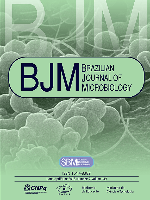
BRAZILIAN JOURNAL OF MICROBIOLOGY
Scope & Guideline
Bridging Health and Environment Through Microbiology
Introduction
Aims and Scopes
- Microbial Pathogenesis and Infectious Diseases:
Research examining the mechanisms of pathogenicity in bacteria, fungi, and viruses, including studies on antimicrobial resistance and virulence factors. - Environmental Microbiology and Bioremediation:
Studies focusing on microbial diversity in various environments, including soil and water, and the application of microbes for bioremediation of pollutants. - Food Microbiology and Safety:
Research on foodborne pathogens, probiotics, and the development of biopreservation techniques to enhance food safety. - Plant-Microbe Interactions:
Investigations into the roles of beneficial microbes in plant growth promotion and disease resistance, including the use of microbial inoculants. - Molecular and Genomic Microbiology:
Research utilizing molecular techniques and genomic analysis to understand microbial function, diversity, and evolution. - Clinical Microbiology and Diagnostics:
Studies focusing on the development of diagnostic tools and methodologies for detecting infectious agents and understanding their epidemiology.
Trending and Emerging
- Antimicrobial Resistance and Novel Therapeutics:
There is a growing emphasis on understanding mechanisms of resistance and exploring novel therapeutic strategies, including the use of bacteriophages, antimicrobial peptides, and natural compounds. - Microbial Applications in Agriculture:
Research is increasingly focused on the use of beneficial microbes for sustainable agricultural practices, including biofertilizers and biocontrol agents. - Impact of Microbiomes on Health:
Emerging studies are exploring the role of microbiomes in human health, particularly gut microbiota and its implications for diseases, nutrition, and metabolism. - Biotechnological Innovations:
There is a rising trend in studies that apply microbial biotechnology for industrial applications, including enzyme production, bioremediation, and bioenergy. - Infection Control and Public Health:
Research focusing on public health implications of microbial infections, including zoonoses and emerging infectious diseases, is becoming more prominent.
Declining or Waning
- Traditional Antibiotics and Their Mechanisms:
Research focusing solely on the mechanisms of action of traditional antibiotics is decreasing, as the field shifts towards exploring alternative therapies and the implications of antimicrobial resistance. - Basic Taxonomy of Microorganisms:
Studies that primarily focus on the classification and taxonomy of microorganisms without exploring their ecological roles or applications are becoming less frequent. - Single-Organism Studies:
Publications that focus on the study of single microbial species are declining, with a trend towards more complex studies involving microbial communities and their interactions.
Similar Journals
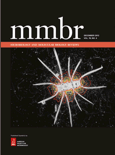
MICROBIOLOGY AND MOLECULAR BIOLOGY REVIEWS
Bridging Microbial Insights with Molecular InnovationsMICROBIOLOGY AND MOLECULAR BIOLOGY REVIEWS, published by the American Society for Microbiology, is a premier journal dedicated to advancing the fields of microbiology and molecular biology. With an impressive impact factor reflective of its Q1 ranking in categories such as Immunology, Infectious Diseases, and Molecular Biology, this journal consistently showcases high-quality, peer-reviewed articles that contribute to the current understanding of microbial life and molecular mechanisms. Operating since 1997, the journal aims to bridge the gap between microbiological methods and molecular biology applications, making it an essential resource for researchers, professionals, and students alike. Readers can access content through various platforms, ensuring that the latest findings are readily available to the scientific community. With its esteemed reputation, MICROBIOLOGY AND MOLECULAR BIOLOGY REVIEWS remains a leading voice in the exploration of the life sciences, catering to a broad audience deeply invested in unraveling the complexities of microbial and molecular systems.
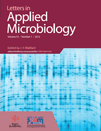
LETTERS IN APPLIED MICROBIOLOGY
Innovating Insights in Applied MicrobiologyLETTERS IN APPLIED MICROBIOLOGY, published by OXFORD UNIVERSITY PRESS, is a prominent journal in the field of applied microbiology, serving as an essential platform for researchers and professionals to disseminate innovative findings. With an ISSN of 0266-8254 and an E-ISSN of 1472-765X, this peer-reviewed journal has been contributing to the scientific community since 1985 and continues to engage with cutting-edge research through 2024. With its current Scopus ranking placing it in the 45th percentile of its category, specifically at rank #70 out of 127 in the Applied Microbiology and Biotechnology field, it underscores its significance in advancing knowledge and applications pertinent to microbial science. Although it is not open access, LETTERS IN APPLIED MICROBIOLOGY offers comprehensive insights aimed at enhancing the understanding of microbiological phenomena in practical scenarios, making it a valuable resource for both seasoned experts and emerging scholars.

International Journal of Microbiology
Advancing Knowledge in Microbiology for a Better TomorrowWelcome to the International Journal of Microbiology, a premier platform dedicated to the dissemination of cutting-edge research in the field of microbiology. Published by HINDAWI LTD, this open-access journal has been making significant strides since its inception in 2009, ensuring that high-quality research is accessible to all. Situated in Egypt, the journal caters to an international audience, fostering collaboration across borders. With a commendable impact factor and recognized in the Q2 category for both general and medical microbiology, it ranks 48th out of 182 and 40th out of 140, respectively, according to Scopus statistics, placing it among the top-tier journals in its field. The International Journal of Microbiology publishes articles that explore various aspects of microbiology, from fundamental studies to applied research, thus contributing significantly to advancements in medical, agricultural, and environmental microbiology. This journal is an essential resource for researchers, professionals, and students eager to stay at the forefront of microbiological studies and their applications.
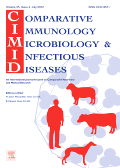
COMPARATIVE IMMUNOLOGY MICROBIOLOGY AND INFECTIOUS DISEASES
Unraveling Complexities of Immune ResponsesComparative Immunology Microbiology and Infectious Diseases, published by Elsevier Science Ltd, is a prominent journal dedicated to advancing the fields of immunology, microbiology, infectious diseases, and veterinary sciences. Established in 1978, this journal has become a vital resource for researchers and professionals alike, with a commendable impact factor that reflects its significance in academia. The journal, available in both print and electronic formats (ISSN: 0147-9571, E-ISSN: 1878-1667), stands out for its commitment to disseminating innovative research findings, particularly through its categorization in Q2 and Q3 quartiles across various related disciplines as of 2023. The journal aims to provide insightful comparative analyses that enhance our understanding of host-pathogen interactions, immune responses, and disease manifestations. With a global readership base, it serves as a platform for collaborative discourse among scientists and professionals, ultimately contributing to the improvement of health outcomes worldwide.

CRITICAL REVIEWS IN MICROBIOLOGY
Pioneering Reviews that Transform MicrobiologyCRITICAL REVIEWS IN MICROBIOLOGY, published by Taylor & Francis Ltd, is a leading peer-reviewed journal that has made significant contributions to the field of microbiology since its inception in 1971. With a prestigious Q1 ranking in Applied Microbiology and Biotechnology, as well as in Medicine and Microbiology, this journal is recognized for its high-quality reviews that synthesize current research and emerging trends in the discipline. Researchers and professionals rely on its comprehensive evaluations and critical insights, helping to advance knowledge and application in various microbiological contexts. Although the journal does not currently operate under an open access model, it remains an invaluable resource for academics seeking to stay at the forefront of microbiological advances. With a consistent publication record, CRITICAL REVIEWS IN MICROBIOLOGY continues to support the scholarly community by addressing key issues and innovations within the field.
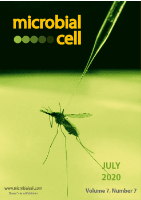
Microbial Cell
Unveiling the secrets of microbial interactions.Microbial Cell is a distinguished open-access journal published by SHARED SCIENCE PUBLISHERS OG, focusing on the dynamic fields of microbiology, biochemistry, and molecular biology. Since its establishment in 2014, Microbial Cell has been at the forefront of disseminating cutting-edge research essential for advancing our understanding of microbial functions and interactions. With a commendable impact factor and ranking in the top quartiles (Q1 and Q2) across several categories, including Applied Microbiology and Biotechnology and Parasitology, this journal serves as an invaluable resource for researchers, professionals, and students alike. It features a comprehensive scope that encompasses the latest findings in genetics, cell biology, and virology, facilitating the academic community's access to high-quality peer-reviewed work. Microbial Cell not only contributes to advancing microbial sciences but also fosters an inclusive platform for knowledge sharing and collaboration in the scientific community.

Microbiology Research
Elevating Microbiology: Where Research Meets AccessibilityMicrobiology Research, published by MDPI, stands as a pivotal open-access journal in the field of microbiology, having established its presence since 2010. Based in Switzerland, this journal strives to provide a platform for innovative research and cutting-edge findings in various branches of microbiology, including medical microbiology and molecular biology. With an impact factor that reflects its dedication to scholarly excellence, Microbiology Research is classified in the Q3 category for both microbiology and medical microbiology, and Q4 for molecular biology as of 2023, indicating its growing importance and outreach within these domains. The journal aims to foster discussion and collaboration among researchers, professionals, and students by presenting articles that cover a wide array of topics and methodologies in microbiological research. Leveraging its open-access model, Microbiology Research ensures that high-quality research is accessible to a global audience, thus facilitating the advancement of knowledge and innovation in the microbial sciences.

Jundishapur Journal of Microbiology
Advancing microbial knowledge for a healthier tomorrow.Welcome to the Jundishapur Journal of Microbiology, a peer-reviewed publication dedicated to advancing the field of microbiology. Published by BRIEFLAND, this journal focuses on key areas such as infectious diseases and medical microbiology, offering a platform for researchers to share their findings from 2009 to 2024. Despite its current positioning in Quartile 4 across various categories in 2023, the journal provides a valuable resource for budding scientists and established professionals alike, contributing to the growing body of knowledge in these critical areas. While it is not an open-access journal, the Jundishapur Journal prioritizes the dissemination of research in the Netherlands, facilitating a deeper understanding of microbial science and its implications for public health. Join a community of innovators committed to exploring both emerging and established themes in microbiology.
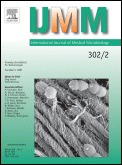
INTERNATIONAL JOURNAL OF MEDICAL MICROBIOLOGY
Innovating Solutions for Infectious DiseasesWelcome to the International Journal of Medical Microbiology, a leading publication in the field of microbiological research and infectious diseases, offered by Elsevier GmbH. Established in 2000, this esteemed journal provides a scholarly platform for the presentation of high-quality research, reviews, and innovations that bridge medical microbiology and clinical applications. With an impressive impact factor positioning it within the Q1 category across multiple disciplines, including Infectious Diseases, Microbiology, and Medicine, the journal is recognized for its rigorous peer-review process and significant contributions to advancing our understanding of microbial pathogenesis, diagnostics, and therapeutics. The International Journal of Medical Microbiology is committed to open access, promoting the dissemination of knowledge and accessibility for researchers, professionals, and students worldwide. Based in Munich, Germany, the journal continues to play a vital role in the global scientific community, fostering collaborations and inspiring future innovations in the fight against infectious diseases.
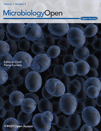
MicrobiologyOpen
Transforming knowledge into accessible microbiological breakthroughs.MicrobiologyOpen is a prestigious, open access journal published by WILEY, dedicated to advancing the field of microbiology. Since its inception in 2012, this journal has firmly established itself as a significant platform for researchers, professionals, and students alike, facilitating the dissemination of high-quality research findings across a wide range of microbiological disciplines. With an impressive impact factor and a ranking in the 76th percentile of Scopus for immunology and microbiology, MicrobiologyOpen offers a robust forum for innovative studies, reviews, and compelling insights that push the boundaries of scientific understanding. The journal's commitment to open access ensures that groundbreaking research is freely available to the global community, fostering collaboration and knowledge-sharing. As it continues to evolve until 2024, MicrobiologyOpen remains pivotal for anyone looking to stay at the forefront of microbiological research.